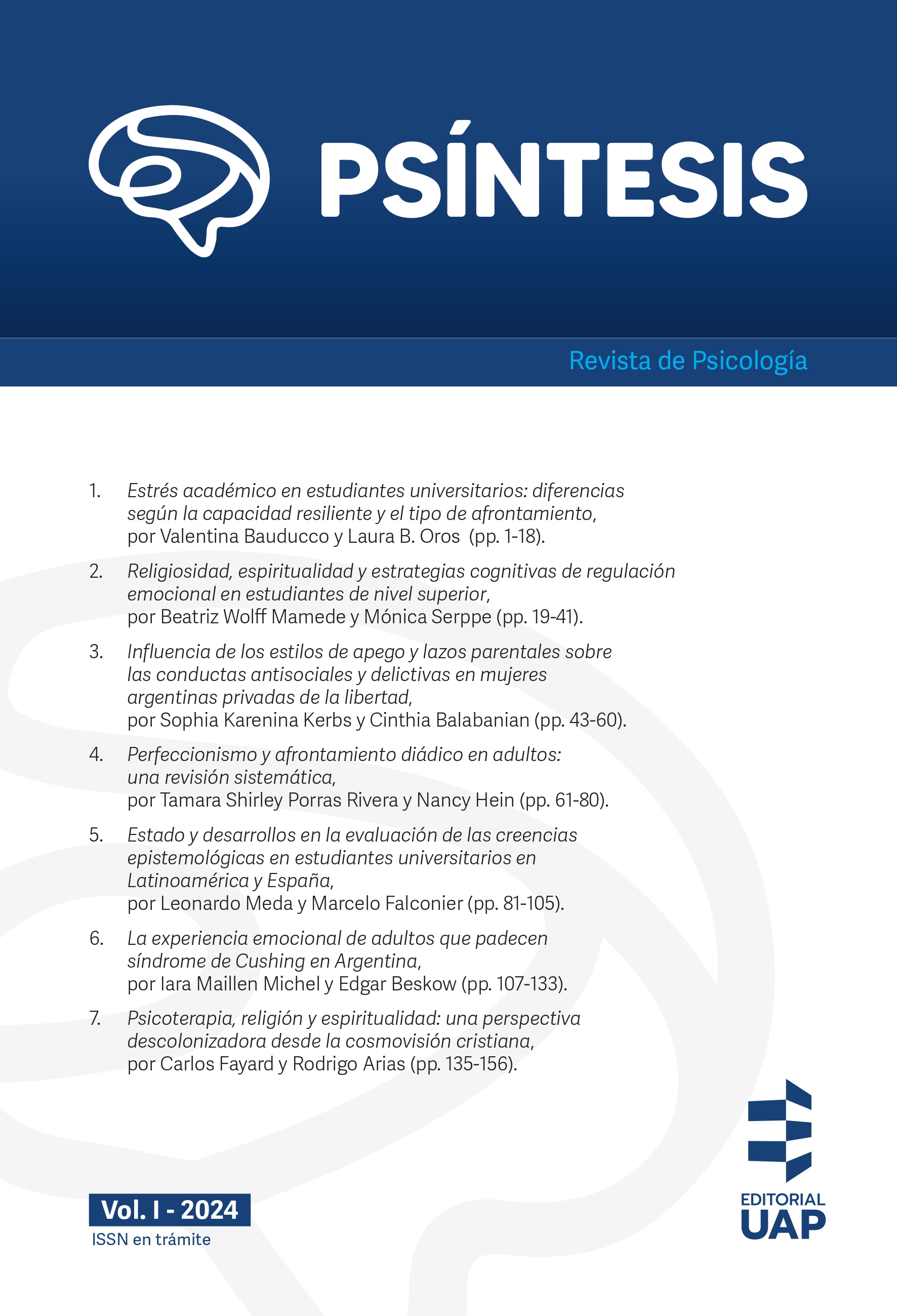Perfeccionismo y afrontamiento diádico en adultos: una revisión sistemática
DOI:
https://doi.org/10.56487/gt6zkk34Palabras clave:
Perfeccionismo multidimensional — Afrontamiento diádico — Afrontamiento relacional — Perfeccionismo en pareja — Perfeccionismo orientado a los demás — Perfeccionismo socialmente prescripto — Perfeccionismo autorientadoResumen
El objetivo de esta investigación fue conocer estudios de perfeccionismo y de afrontamiento diádico en adultos y analizar si existen investigaciones que asocien el perfeccionismo multidimensional con el afrontamiento diádico en adultos que se encuentran en pareja. La presente revisión incluyó bibliografía de revisión literaria que empleó instrumentos psicométricos en estudios experimentales y cuasi experimentales. Asimismo, se consideraron investigaciones realizadas con muestras de participantes cuyas edades oscilaran entre los 18 y 78 años. Los resultados sugieren que las dimensiones del perfeccionismo (autorientado, socialmente prescripto y orientado a otros) desempeñan un papel fundamental en la forma en que las parejas enfrentan el estrés y resuelven conflictos. Aquellos proporcionan evidencia de que, dependiendo de la dimensión del perfeccionismo que se presente más alta, se puede tener efectos, en su mayoría negativos, sobre el afrontamiento diádico. Las parejas optan por estrategias negativas que aumentan las conductas conflictivas sin alcanzar un afrontamiento adecuado y positivo en respuesta a las dificultades. La comprensión de estas dinámicas es esencial para promover relaciones saludables y satisfactorias.
Descargas
Referencias
Arjmand, A., Fallahchai, S. R. y Zarei, E. (2015). Perfectionism and forgiveness role in the prediction of marital conflict. Bulletin of Environment, Pharmacology and Life Sciences, 4(6), 133-139.
Berg, C. A. y Upchurch, R. (2007). A developmental-contextual model of couples coping with chronic illness across the adult life span. Psychological Bulletin, 133(6), 920-954. https://doi.org/10.1037/0033-2909.133.6.920
Bodenmann, G. (1995). A systemic-transactional conceptualization of stress and coping in couples. Swiss Journal of Psychology, 54(1), 34-49. (2008). Dyadic coping and the significance of this concept for prevention and therapy. Zeitschrift fur Gesundheitspsychologie, 16, 108-111. https://doi.org/10.1026/0943-8149.16.3.108
Bodenmann, G., Pihet, S. y Kayser, K. (2006). The relationship between dyadic coping marital quality and well-being: A two-year longitudinal Study. Journal of Family Psychology, 20(3), 485-493. https://doi.org/10.1037/0893-3200.20.3.485
Chemisquy, S. (2017). Las dificultades interpersonales de los perfeccionistas: consideraciones teóricas sobre el modelo de desconexión social. Revista Argentina de Ciencias del Comportamiento, 9(2), 77-92. https://doi.org/10.32348/1852.4206.v9.n2.16646
Coyne, J. C. y Smith, D. A. F. (1991). Couples coping with a myocardial infarction: A contextual perspective on wives’ distress. Journal of Personality and Social Psychology, 61(3), 404-412. https://doi.org/10.1037/0022-3514.61.3.404
DeLongis, A. y O’Brien, T. B. (1990). An interpersonal framework for stress and coping: an application to the families of Alzheimer’s patients. En M. A. P. Stephens, J. H. Crowther, S. E. Hobfoll, y D. L. Tennenbaum (Eds.), Stress and coping in later-life families (pp. 221-239). Hemisphere.
Dimitrovsky, L., Levy-Shiff, R. y Schattner-Zanany, I. (2002). Dimensions of depression and perfectionism in pregnant and nonpregnant women: Their levels and interrelationships and their relationship to marital satisfaction. The Journal of Psychology: Interdisciplinary and Applied, 136(6), 631-646. https://doi.org/10.1080/00223980209604824
Falconier, K. M. y Kuhn, R. (2019). Dyadic coping in couples: A conceptual integration and review of the empirical literature. Frontiers in Psychology, 10(571). https://doi.org/10.3389/fpsyg.2019.00571
Fernández, S. A., Freire, A. R. O., Aparicio F. M. del P. y García F. J. M. (2021). Dificultades interpersonales en las relaciones heterosexuales y pensamientos automáticos perfeccionistas en universitarios ecuatorianos. European Journal of Health Research, 7(1), 1-12. https://doi.org/10.32457/ejhr.v7i1.1389
Flett, G. L., Hewitt, P. L., Shapiro, B. y Rayman, J. (2001-2002). Perfectionism, beliefs, and adjustment in dating relationships. Current Psychology: A Journal for Diverse Perspectives on Diverse Psychological Issues, 20(4), 289-311. https://doi.org/10.1007/s12144-001-1013-4
Franchi, S. (2010). Estilo de personalidad perfeccionista y depresión. Perspectivas en Psicología, 13, 53-64.
Frost, R., Marten, P., Lahart, C. y Rosenblate, R. (1990). The dimensions of perfectionism. Cognitive Therapy and Research, 14(5), 449-468. https://sci-hub.se/10.1007/bf01172967
Haring, M., Hewitt, P. L. y Flett, G. L. (2003). Perfectionism, coping, and quality of intimate relationships. Journal of Marriage and Family, 65(1), 143-158. https://doi.org/10.1111/j.1741-3737.2003.00143.x
Hewitt, P. L. y Flett, G. L. (1991). Perfectionism in the self and social contexts: Conceptualization, assessment, and association with psychopathology. Journal of Personality and Social Psychology, 60(3), 456-470. https://doi.org/10.1037/0022-3514.60.3.456
Hewitt, P. L., Flett, G. L. y Mikail, S. F. (1995). Perfectionism and relationship adjustment in pain patients and their spouses. Journal of Family Psychology, 9(3), 335-347. https://doi.org/10.1037/0893-3200.9.3.335
Kayser, K. y Revenson, T. A. (2016). Including the cultural context in dyadic coping: Directions for future research and practice. En M. K. Falconier, A. K. Randall, and G. Bodenmann (Eds.), Couples coping with stress: A cross-cultural perspective (pp. 285-299). Routledge/Taylor and Francis Group.
Lafontaine, M.-F., Péloquin, K., Levesque, C., Azzi, S., Daigle, M.-P. y Brassard, A. (2019). Beyond the simple association between romantic attachment insecurity and Dyadic coping: An examination of romantic perfectionism as a mediator. Journal of Relationships Research, 10(e12), 1-9. https://doi.org/10.1017/jrr.2019.6
Lago, A., Keegan, E., Arana, F., Maglio, A. L., López, P. y Scappatura, M. L. (2005). Las relaciones interpersonales de los perfeccionistas: revisión conceptual y aplicaciones en terapia de pareja. En XII Jornadas de Investigación y Primer Encuentro de Investigadores en Psicología del Mercosur. Facultad de Psicología, Universidad de Buenos Aires.
Lyons, R. F., Mickelson, K. D., Sullivan, M. J. L. y Coyne, J. C. (1998). Coping as a communal process. Journal of Social and Personal Relationships, 15(5), 579-605. https://doi.org/10.1177/0265407598155001
Mackinnon, S. P., Sherry, S. B., Antony, M. M., Stewart, S. H., Sherry, D. L. y Hartling, N. (2012). Caught in a bad romance: Perfectionism, conflict, and depression in romantic relationships. Journal of Family Psychology, 26(2), 215-225. https://doi.org/10.1037/a0027402
Revenson, T. A. (1994). Social support and marital coping with chronic illness. Annals of Behavioral Medicine, 16(2), 122-130.
Sherry, S. B., Hewitt, P. L., Flett, G. L. y Harvey, M. (2003). Perfectionism dimensions, perfectionistic attitudes, dependent attitudes, and depression in psychiatric patients and university students. Journal of Counseling Psychology, 50(3), 373-386.https://doi.org/10.1037/0022-0167.50.3.373
Sherry, S. B., Sherry, D. L., Macneil, M. A., Smith, M. M., Mackinnon, S. P., Stewart, S. H. y Antony, M. M. (2014). Does socially prescribed perfectionism predict daily conflict? A 14-day daily diary study of romantic couples using self- and partner-reports. Personality and Individual Differences, 61-62, 24-27. https://doi.org/10.1016/j.paid.2013.12.028
Stoeber, J. (2012). Dyadic perfectionism in romantic relationships: Predicting relationship satisfaction and long-term commitment. Personality and Individual Differences, 53(3), 300-305. https://doi.org/10.1016/j.paid.2012.04.002
Totonchi M. y Hassan, A. (2017). Perfectionism and dyadic relationship: A systematic review. International Journal of Academic Research in Business and Social Sciences, 7, 472-485. http://doi.org/10.6007/IJARBSS/v7-i14/3683
Ucatólica [Universidad Católica de Chile]. (16 de noviembre de 2021). Afrontamiento diádico del estrés en la pareja: el rol de la religiosidad y la cultura [Video]. YouTube.https://www.youtube.com/watch?v=y3Fd7w2iLi0
Descargas
Publicado
Número
Sección
Licencia
Derechos de autor 2024 Psíntesis

Esta obra está bajo una licencia internacional Creative Commons Atribución-NoComercial-CompartirIgual 4.0.





